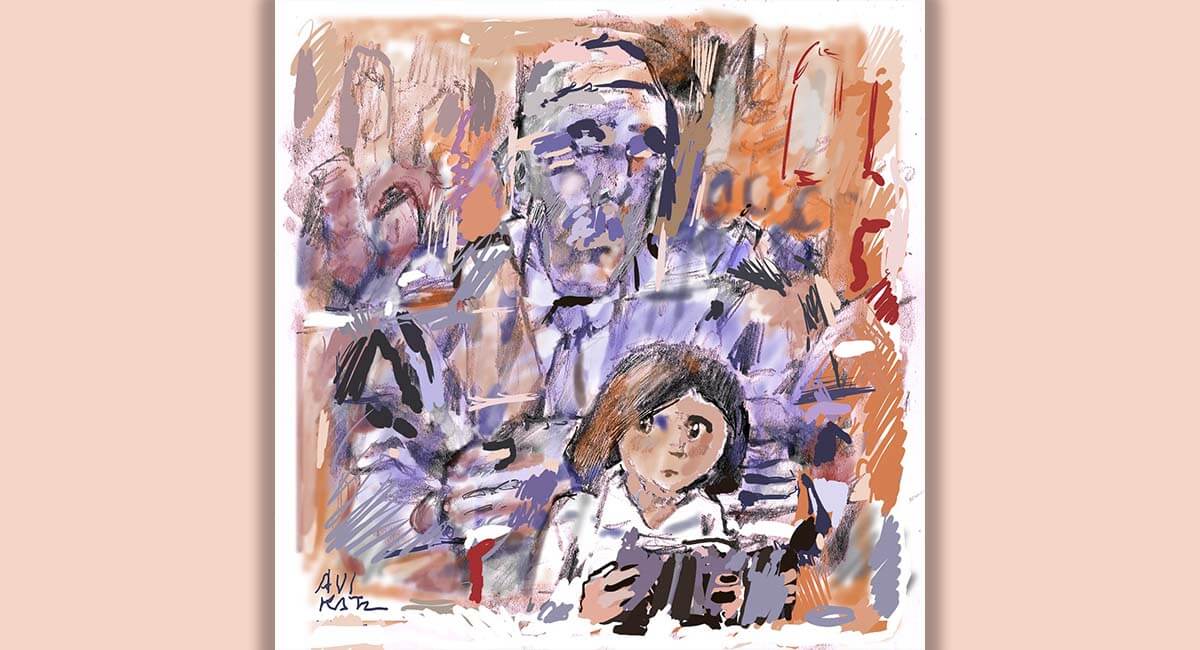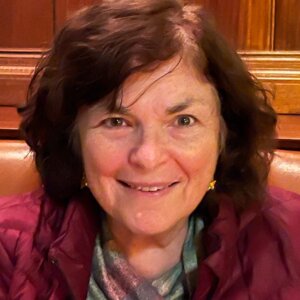Must I say kaddish for my abusive father?
I had prayed to God for help. Now, for the first time, I could pray to God from my synagogue.

Graphic by Angelie Zaslavsky
When I recite Yizkor during Yom Kippur, I think of my mother, hunched over praying in the women’s section of the orthodox shul we attended during my childhood in Argentina. She cried while imploring God to inscribe her loved ones in the Book of Life, hoisted me above her so I could see the shofar blowing and rubbed my cheek with her soft hands to wish me good Yom Tov.
I rise during Kaddish to feel closer to her, to be closer to God.
But I do not say Kaddish for my father.
I could not pay respect to a man who sexually abused me when I was growing up, who threatened to hurt me if I told my mother about his harassment.
The abuse happened nearly 50 years ago, but I only became aware of it 15 years ago, while my father was still alive. The memories were stashed away in the dark cold world of my subconscious, protecting me from the torment.
But the effects of the abuse bubbled up, surfacing as phobias. I had trouble focusing, difficulties making friends and being intimate with loved ones. I grew into adulthood with my self-esteem shattered and my sense of self fragmented.
Many childhood abuse victims grow into troubled adults. Some turn to drugs and alcohol to cope with the stress, others cut themselves or attempt suicide.
I turned to God. My mother enrolled me in a yeshiva for elementary school. While the abuse was taking place, I learned biblical stories about God parting the Red Sea to help the Israelites cross to safety, and I felt there was hope. I learned midrashim about rabbis trekking through snowstorms at midnight to visit the sick, and I felt goodness did exist in the world.
As I got older, I went to shul on Shabbat with my mother. I did so partly to seek refuge from my father, but also to immerse myself in holiness, a spiritual canopy that soothed me, hinting at a brighter future. When I graduated from college, my life spinning off the rails, I felt alone, lost and unmoored. While waiting for a train at Clarendon Metro Station in Virginia, I heard myself humming a tune.
Adon Olam.
I was aware of God’s presence. But the music stopped in a flash. The subway approached the station. I boarded the train and went to work.
Years later, I met an honest, supportive and loving Jewish man, got married and had two wonderful children. A miracle. Feeling loved and safe from harm, my memories of the abuse surfaced. I confronted my father, and he denied the abuse, as I expected he would. But the confrontation freed me from decades of self-imposed silence he extorted from me to keep “our secret.”
I searched the internet to find information of my obligations to my father as a daughter and a Jew.
Maimonides stated that parents who do not repent for mistreating their children are still due honor and reverence. Other scholars suggest that Maimonides called for honoring parents who lost control, but not whose actions are intentionally harmful.
In his book, God, Love, Sex and Family, Rabbi Michael Gold concludes that parents who harm their children knowingly are not worthy of respect.
“Sexual abuse is clearly evil,” Gold told me recently in a telephone interview. He added that sons or daughters may and should refrain from honoring a parent if doing so will destroy their sense of self.
A rabbi close to my family advised me that my responsibilities toward my abusive father were minimal. If he needed to go to the doctor, I could call him a cab. Or I could let him fend for himself.
I stopped talking to my father.
Then he died. I attended the funeral and sat shiva — for my mother’s sake.
But I did not recite Kaddish.
I did not recite Kaddish for him at his first yahrzeit.
I did not recite kaddish for him on most subsequent yarhzeits.
Following along with morning services during Yom Kippur last year, I flipped through the Lev Shalem Siddur and read, “A Yizkor Meditation in Memory of a Parent Who Hurt,” by Rabbi Robert Saks.
My heart raced as I read on. The supplicant expressed conflicting feelings about rising for Kaddish because the parent’s death left behind a “legacy of unhealed wounds.”
The supplicant pleaded, “I do not want to pretend to love, or to grief that I do not feel, but I do want to do what is right as a Jew and as a child.” The supplicant asked God for help in subduing “bitter emotions” and for liberation from the “oppression of my hurt and anger.”
I rejoiced over my good fortune. I had prayed to God for help from the dark corners of my soul in the hell of my privacy. Now, for the first time, I could pray to God from my synagogue, reciting a meditation cited by thousands of congregants around the country — abuse victims like me, who have struggled with how to observe the age-old ritual of saying Kaddish and be honest with themselves.
I recited the prayer composed by Rabbi Saks.
Then I rose to recite the Kaddish with the rest of the congregation.




















